Have We Been Wrong About This One Health Food All Along?
If you're feeling confused about dairy and whether or not you should be including it in your diet, you are not alone! It seems everyone has a strong opinion one way or the other on this topic.
So, Is Milk Good For You?
Weren't we always told as kids to include milk in our diet to build strong bones? What gives?
Well, to start, the research is complicated and sometimes conflicting. There are studies suggesting too much dairy may increase your risk of heart disease, certain cancers and even cause acne (1,2,3,4,5). And there are just as many studies implying the opposite (6,7,8,9,10). Understanding how to digest the science, knowing what to look for, and which studies carry the most weight is key.
Nutrition in itself it difficult to research, given the large number of variables in our diets and lifestyle - especially if you are trying to isolate one specific nutrient, like saturated fat or calcium. Dairy is a broad category that includes milk, cheese, yogurt, cottage cheese, butter, ice cream, etc. And not every study differentiates between grass-fed, organic, conventional, full fat and non-fat varieties.
Dairy is any milk or milk product that comes from an animal, including cows, sheep and goats.
There is also a lot of politics and money involved in our food supply which can sway commodity use, marketing and even dietary recommendations (11). A majority of dairy research is funded by groups who benefit from the sale of more milk products.
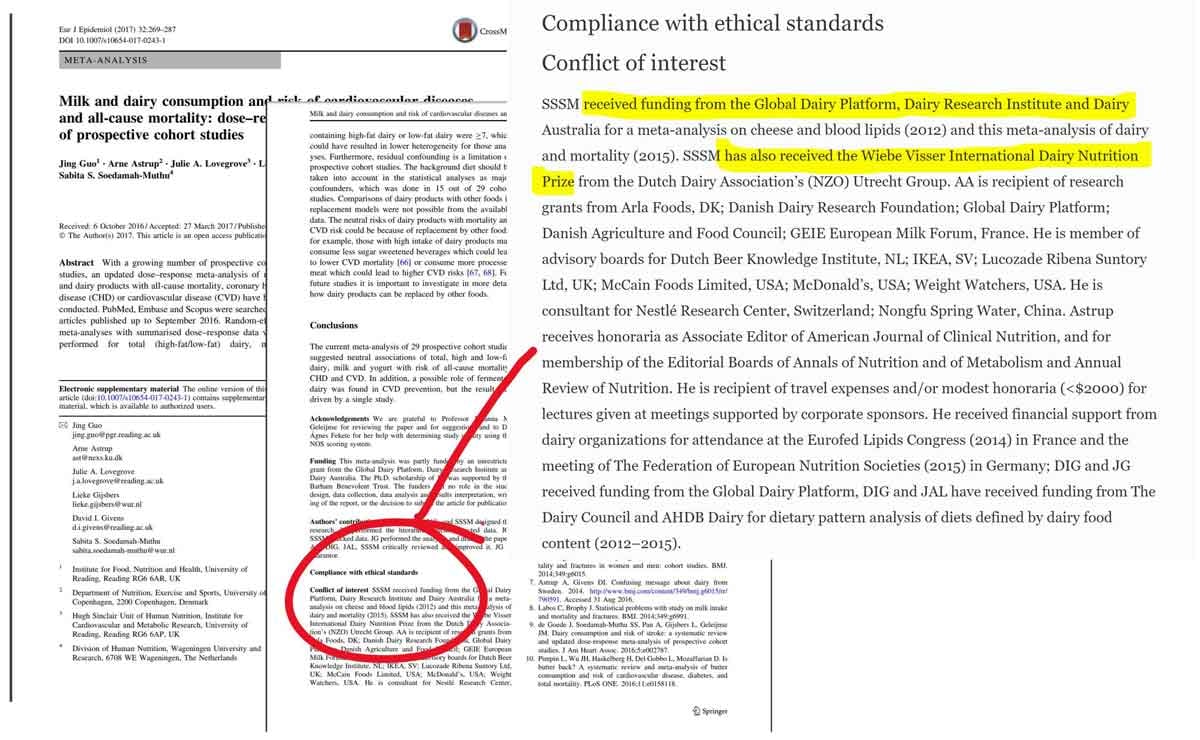
Let's take a look at what the science actually says and some common reasons one may want to either avoid dairy all together or add it to their diet.
Potential Health Benefits of Dairy:
We can start by breaking down the proposed benefits of milk. There has to be at least a few good reasons why the USDA and many health professionals recommend 2 to 3 servings per day as a part of a healthy diet.
Is Milk Healthy?
As long as you are not choosing heavily processed options, with added sugar, fats and preservatives, dairy can be a great source of many key nutrients. Milk is most notable for protein, potassium and calcium. A single cup of milk contains:
- 8 grams of Protein - important for building and maintaining lean muscle
- 30% of your daily value for Calcium - maintains healthy muscle function and bone health
- 10% of your daily value for Potassium - helps regulate blood pressure and important for bone health.
Milk is also a great source of vitamin A and D, but these are added and not naturally occurring and it is entirely possible to get these nutrients from dairy-free foods. Orange veggies, like pumpkin and carrots provide more than 100% of the daily value for vitamin A per serving. And because vitamin D is absorbed from sunlight and stored in the body, meat, seafood and eggs are a natural source you can look for. There are also dairy-free sources of calcium, potassium and protein. So while milk is nutritious, it doesn't have anything you can't find elsewhere.
It is easy to get options that fit your macros, with full fat and non-fat versions almost always available. Just keep in mind, when fat goes down, carbs go up – but only a little. And sometimes, removing fat can cause minor changes in protein content.
Sour cream, cream cheese, cream and butter are not significant sources of protein and provide very little nutrition compared to other sources of dairy.
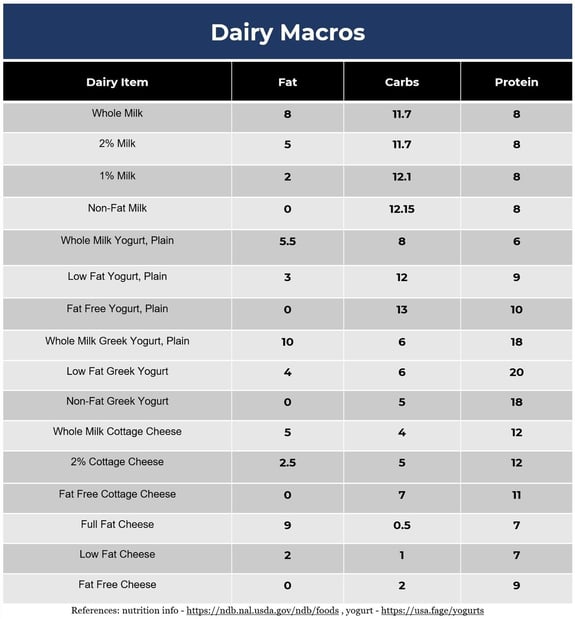
Is Milk Good For Your Bones?
Milk is definitely good for your bones, right?
Because majority of your bones are made up of calcium, which is constantly being broken down and rebuilt through a process called "remodeling", it would make sense that a diet adequate in calcium containing foods like milk, supports bone health (13,14). And there is a lot of research supporting this.
Calcium is required for every muscle contraction in your body, including your heart beat. And when you don't get enough through foods or supplements, your body takes calcium from your bones to support daily bodily functions. Over time, this can lead to weak bones and osteoporosis. But there are a number of key factors involved in this process that can influence overall bone health (15).
Strong bones are reliant on calcium, protein, magnesium, phosphorus, vitamin D, potassium, and fluoride. Weight bearing activity, exposure to sunlight, hormone levels, and a healthy lifestyle can also significantly affect bone health.
While it is well established that calcium intake can support stronger bones, the amount we actually need is not completely clear. The USDA recommends 1,000 to 1,200 milligrams of calcium per day, which would equal 3 to 4 servings of dairy. But where does this amount come from?
The 1200 mg/day guidelines are based on a theory scientists made in the late 1990's, under the assumption that keeping calcium amounts in the blood higher than the amount needed for bone remodeling, would prevent the need to borrow calcium from bone storage (16). But more recent studies have suggested that high amounts of calcium do not influence bone health more strongly and having too much may influence more bone fractures.
In a large long-term study by Harvard, men and women who drank one glass of milk or less per week in teenage years, had the same risk of bone fractures as those who drank two or more glasses. (17) And when looking at larger prospective studies combined, there is no association between calcium intake and fracture risk, but there is a possible increase in risk with high calcium intake (18,19).
The bottom line is, both diet and lifestyle are important for building strong bones. And dairy isn't the only source of calcium you can find - dark leafy greens, tofu and seafood can also provide an excellent source (20). Your best bet for healthy bones seems to be an overall healthy diet with adequate nutrition from a variety of sources and regular physical activity.
Fermented Milk
Some types of fermented dairy may benefit gut health. Fermented dairy is dairy made with added bacteria. These bacteria are also called probiotics, which is just a fancy way of saying microbes that might benefit our health. The science suggests that these little buggers promote gut health, strengthen your immune system and even help improve your mood (21,22).
Yogurt and some cheese, like parmesan, swiss, gouda and blue cheese, have small amounts of probiotics in them. Kefir, a trendy yogurt style beverage, is made with bacteria and yeast, making it an even more potent source of the good stuff. When shopping for fermented dairy options, be sure to read the label and look for live and active cultures.
Fermented dairy also helps decrease absorption of cholesterol in the body, which may be why intake has been associated with a reduced risk of type 2 diabetes and heart disease (23,24,25).
Is Milk Bad For You?
OK, we’ve established dairy has actual nutrition and some potential health benefits, now let's take a look at some of the frequent concerns associated with milk products.
Saturated Fat
Dairy is often high in saturated fat which is associated with increased heart health risks (26). Even though recent association studies show saturated fat may not be as bad as we originally thought, these studies have yet to disprove the cause and effect seen with intakes of saturated fat and increased blood cholesterol (27,28). And a diet high in saturated fat, does not leave room for beneficial fats that promote heart health. According to research, replacing even 1% of dietary saturated fat with heart healthy unsaturated fats, may decrease your risk of heart disease up to 8% (29). So while there may still be some debate over whether or not saturated fat is neutral or detrimental to your health, having too much can tip the balance of your macro intake away from desired health benefits.
Nearly half of milk produced goes towards making cheese and cheese is the number one source of saturated fat in the American diet (30). It’s also the single most addicting food we can eat (31).
Not all dairy is created equal. Opting for low fat or fat free options is one way to cut your intake of saturated fat. And some types of dairy, like organic, may actually have a better fatty acid complex to promote heart health (32).
Hormones in Milk
By natural design, dairy is loaded with hormones. And one hormone in particular that is of most concern is insulin growth factor one, or IGF-1. In some studies, high levels of this hormone is associated with increased risk of certain types of cancer, heart disease, and acne (33,34,35).
IGF-1 is also naturally occurring in our bodies, and the IGF-1 from dairy is structurally identical to the one in our system. Because studies show consuming dairy can increase blood levels about 18%, there is debate over whether or not this increases your risk of certain diseases (36). Other foods, like meat and soy milk, may also cause our levels to rise (37,38). But the role of this hormone is complex and studies haven't shown a definitive link between IGF-1 and increased cancer risk (39). It is also possible to be deficient in IGF-1, and the serum blood levels you should be striving to maintain depend entirely on your personal needs.
On the flip side, IGF-1 is associated with more lean muscle growth – which makes great sense, given milk is intended to develop a calf to a 2,000 pound adult (40,41). It's also available in supplement form for this very reason. This is certainly worth noting if you are looking to put on mass. In addition, IGF-1 plays a positive role in bone health and immune function (42,43).
While the hormone issue may hold some merit, the theory that keeping IGF-1 levels low to prevent cancer is still widely debated.
If you are looking to gain or maintain more lean muscle, including dairy in your diet may be beneficial. But if you are at risk for certain types of cancer or currently have cancer, you may want to consider avoiding dairy all together.
Much more of the dairy hormone concerns surround the use of extra hormones like Recombinant bovine somatotropin (rBST) or recombinant Bovine Growth Hormone (rBGH). These are genetically modified, synthetic hormones used to promote more milk production by increasing IGF-1 in cows. There is not conclusive evidence to show that these additional hormones are absorbed by the body, mainly because there have been no direct comparisons of IGF-1 levels in people who drink ordinary cow's milk vs. milk stimulated by rBGH (44). If you're concerned about additional hormones in your dairy, look for organic or r-BST free options.
Lactose Intolerance
There is a common argument that eating or drinking dairy is not natural. Milk, after all is cow breast milk intended to nourish a baby calf. We are the only species on earth that continues drinking milk into adulthood. And most adults have lost their ability to digest dairy, with world population studies showing up to 75% of adults are considered lactose intolerant - which is caused by the body no longer producing the enzyme, lactase, which is required to breakdown the sugar, lactose, in milk. Lactose intolerance can lead to anything from bloating and gas to diarrhea and skin problems. These are all signs your body does not want to eat this food.
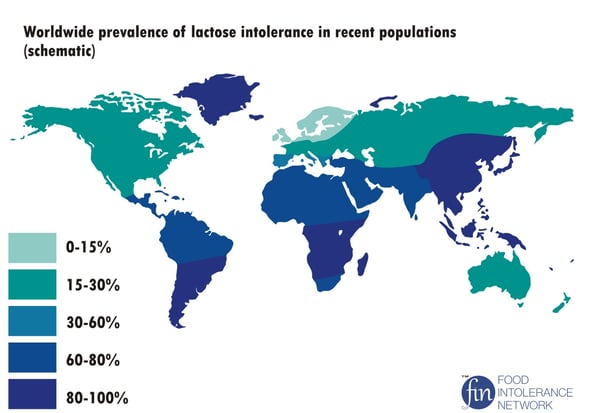
But being lactose intolerant doesn't necessarily mean you need to avoid dairy all together. Some people can still tolerate aged, hard cheeses and fermented dairy where the lactose has been mostly removed. One study even suggests that some cultures in Europe may have biologically adapted their genes over the past 1,000 years to tolerate it better (45). It’s probably why everything in France has cheese or butter… maybe.
Lactose intolerance is not the same thing as a dairy allergy. An allergic reaction to dairy can be life threatening and people who have an immune response to these foods should avoid them at all costs.
Dairy allergies are not well reported, but statistics show they are more common in young children and affect less than 0.5% of the adult population (46).
The Best Milk to Drink
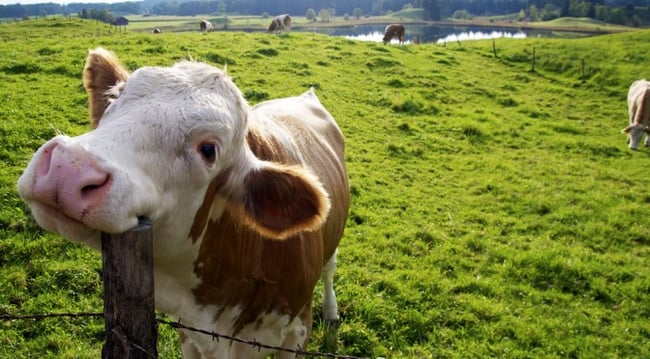
Organic Milk and Grass Fed Milk
It turns out happier cows produce better dairy! The science suggests that organic and grass-fed dairy have a more beneficial fatty acid complex, that's higher in heart healthy omega-3s (47). And it's produced with no added hormones or antibiotics, and cows are not fed GMO feed.
Organic dairy is also slightly higher in vitamin K2 - which supports bone health, heart health, brain health and may reduce risk of some cancers (48,49,50,51). However, milk is not a significant source of vitamin K2 to begin with, so the amount you are actually getting is small - fermented soy, or natto, is actually the best source in the diet.
Could it be that organic dairy is behind all of the positive research? Since studies don't differentiate between organic and traditional dairy, it is hard to tell whether or not these factors play a role in dairy's potential health benefits. But if you are looking for the best types of dairy to add to your diet, organic is likely worth the extra cost.
Skim Milk vs. Whole Milk
You may have also heard some debate around whole milk vs. fat free. Which is best? While non-fat dairy is lower in calories and saturated fat, full fat dairy has been linked to reduced risk of type 2 diabetes, and might promote better weight management (52,53).
However, the research doesn’t show cause and effect - it’s primarily based off association studies which are not as strong. What's best for you likely depends more on how much dairy you’re consuming and the quality of your choice. Sometimes, added ingredients are used to compromised for reduced fat in dairy products. Look for options without added sugar or sodium and opt for organic when possible.
If you’re trying to balance your macros or cut calories, non-fat may still be a better option.
Do Food Politics and Dairy Industry Influence the Science?
It's hard to trust what's good for us when there is a lot of profit being made and questionable politics behind the scenes. The dairy industry spent over $6 million dollars last year lobbying for more support of milk products. Which sounds like a lot, but it's less than 5% of total dollars from agribusinesses combined - wow, that's a lot of money pulling the strings! These lobbying dollars are used in support of legislation that promotes the sale of more dairy products, and also influences our USDA dietary recommendations.
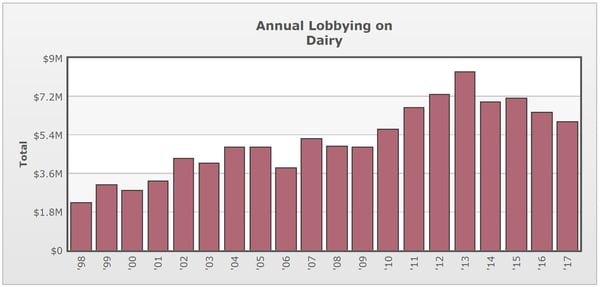
More troubling is the National Dairy Promotion & Research Board, a USDA-sponsored checkoff program that collects a tax from milk producers and uses the funds for promotion of dairy products. Translation - millions of dollars are being given to fast food chains and food producers to add more cheese and milk products to their menu because of their documented health benefits. The check-off program even proudly supported pizza hut pizza in adding 25% more cheese to their pizza.

The thing is, quality research costs a lot of money. It costs millions of dollars to support studying the health benefits of dairy as well as marketing these benefits to the public. And those who have the most to gain, i.e. the dairy industry, are the most likely to fund the science behind it.
While it is troubling to see the amount of cash involved in marketing and potentially biased science, it doesn't mean all of the research is bad either. Do your due diligence and look for conflicts of interest listed in the study, and determine who exactly supported the research. Or check out some easy tips for learning to identify a quality study design and read beyond the abstract.
The Final Verdict
No matter what the media likes to make us believe, there is no single food item will make or break your health. Anything claiming otherwise is just click bait or poor science. There's yet to be research that shows dairy is absolutely essential to well-being or vice versa. Don’t let the “got milk” ads guilt trip you, there's no food you HAVE to have in your diet to be completely healthy.
When it comes to whether or not you should be eating dairy, you’ll have to trust your gut on this one… literally! If it doesn’t agree with your body or you just plain think it’s gross, skip it. But if you enjoy dairy, go for it. Just choose organic and grass-fed when possible and like everything else, don’t overdo it.
By the way, our Trifecta meals plans are made with clean ingredients and dairy free (except keto)!
